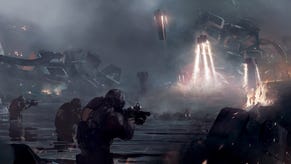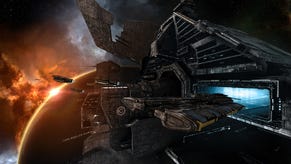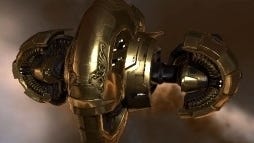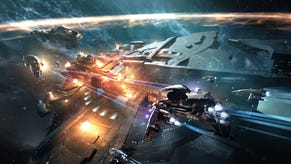Eve Online: 28 Months Later
Who says we're not up to date?
As if by way of illustrating what a cruel game Eve can be, I just lost a fight in my most expensive, well-to-do battleship only minutes before opening up this page to write these words. The ship is dust and I'm royally pissed off. Way more pissed off than I would be at dying in almost any other game. While other MMOs might have coddled me with just a bit of money lost, or a few XP as punishment for my pitiful death, Eve has created several hours of concerted work. It's a bitch.
This might not sound like a good start for an upbeat analysis of Elite's (remarkably pretty) online cousin, but it's losses like this one that give the game its raw edge. Like the thrill of gambling, player vs. player combat in Eve is exciting because you could lose something palpable: the time it took to make the game-money that paid for that ship, along with all the shiny gizmos I kitted it out with. You feel that loss in your guts. And there are few games that can boast that.
Sucker Punch
With a bit of help from my friends I might make the cash back in just a few hours, but there are always other risks. Not least of these is the dangerous journey back from the safer climes of newbie-space, where I'm about to go shopping for technology. In Eve it's all about risk. No other game has provided me with the heart-stopping moments that Eve's PvP has, at least not since I was addicted to Quake 3. Back then I played to defend our league position and reputation, now I play Eve to defend a tract of beautiful space (and its precious resources) from organised and aggressive fleets of enemy players. It's a troublesome commitment and right now I'm fed up with it, but I will go back, and maybe even deal the same kind of blow that I took today to one of our many enemies.
I suppose it's a test of taste and character. Many people will get bored, log off in disgust and never return before they've even taken the first PvP sucker punch - Eve's deep but glacially slow progression isn't to everyone's taste. Personally I always go back, even after the big losses. Because, despite the loss being appalling, the reverse is also true: winning is sublime. Revenge is even better.
It would be easy to have made this recap of the last two years of Eve all about the things that the devs have added to the game since its launch. It's been crammed with content, although not much of it is of the kind you'd be familiar with from other games. I could have waxed on about the new ships, or the new cosmos missions for those people who want to get something from relatively lonesome single-player experiences. Or I could talk about the hundreds of new skills and all that jazz, but really what Eve is most honest about - what it was created to do - is player vs. player combat. It's this urge to conflict that all the best developments of the game have focused on. There's a ton of other activity going on in Eve, but if you're not playing to go to war then you're not really making the most of your adrenal glands, not to mention the cleverer-than-thou combat system that CCP has created.
Miner's Strike
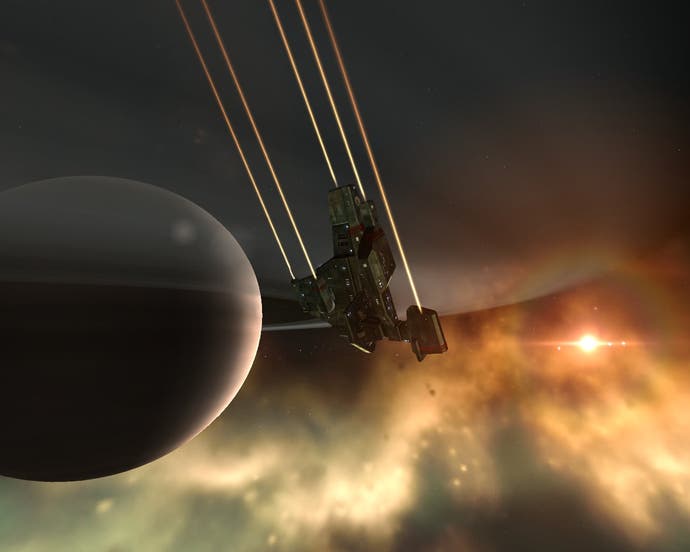
That said, I have to be glad of the miners, the traders and the economists, because it's thanks to their commitment to Eve's bustling cash and manufacture aspect that I can make money from the loot I accrue and get the guns I need for cheap. Eve has become about territory and about resources, and without the committed trade ships plying their varied commerce across this now-familiar galaxy things would be a lot less interesting. Each ship destroyed is a load of those resources lost, and it all has to come from somewhere. I'm only really in this game for the buzz of blowing people up, but I can't help but get caught up in the multitudes of what my friends and enemies get up to. From escorting defenceless industrial ships, to helping keep mining barges safe from enemy interceptors, I'll always have something to do - even if it's just so that I can be sure of where my next ship is coming from. Almost everything that happens in Eve is in some way about people improving their assets. It's the ultimate game of aggressive capitalism, where everyone is ready to fight for the virtual oilfields of peripheral space.
Unlike World of Warcraft, where the fun is generally limited to a bit of scrapping with horde and a lot of goblin-uterus collection, Eve is about the machinations of dozens of player-driven alliances, the memberships of which can climb into the thousands. Guilds in other games might give you a bit of role-playing geek, or just someone to quest with, but the corporations of Eve give you allies, enemies, plots, strategies, trading partners, backstabbing, financial enterprises and drunken Irishmen arguing with a surly Texan about the merits of fitting an electronic-warfare ship.
Smart Bombs
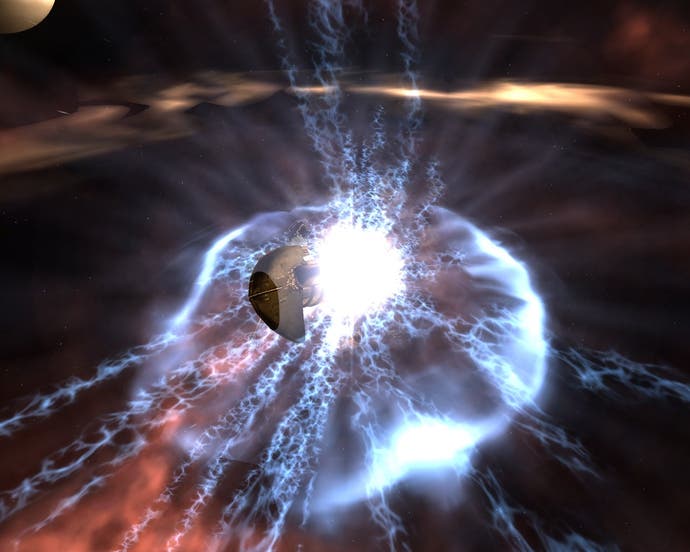
CCP has spent the last 28 months expanding and refining the already-complex combat system in Eve. It mixes turret-based guns, whose tracking speed and ammunition must be considered, with shield specialities, smart bombs, multiple grades of missile technology, armour resistances to four different damage types, propulsion jamming, target jamming and all the electronic countermeasures you could conceive of. The modular system has been steadily evolved through constant PvP testing, so that ships can be loaded out very carefully, each player complementing the next. The big ships might be powerful, but they need smaller ships to apply electronic webs and jamming to their enemies so that losing ships can't escape that final deathblow.
My mistake was taking on a small but tougher ship without support. I just wasn't set up to deal with him. Had I been in another ship the story might have had a quite different ending. And of course there would be no agreement in the chat channels as to what the best ship to do that would have been. Everyone has their favourite steed, and their personal biases for equipment, and the skills necessary to use them. Eve is both broad and deep - and growing in both directions. So the Texan and the Irishman will never agree, because their experiences of the game, sat in front of their screens on far sides of the world, have been so wildly different.
They Will Come
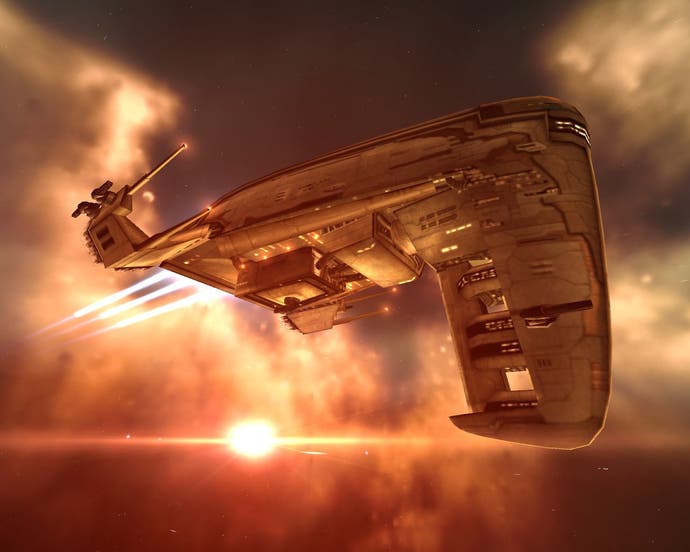
That international angle is just one aspect of Eve's shardless nature: it's just one game, one world. There aren't dozens of servers to choose from, just a single galaxy. Once you log in, you're in the same game as the thousands of other players. That economy of scale creates an environment in which players must compete for space, literally... Eve's map is a fascinating tool, and it can be used to track the wars and the movements, the mining operations and the struggle for sovereignty. Eve's closest cousin in this regard is perhaps the Lineage games, where player guilds fight to take castles and the related tax resources. In Eve they fight to take the deepspace stations - vital outposts around which player activity will thrive. But there's more to it than that. As with everything in Eve, there's another layer of complexity. Players can build their own structures too, the cheapest of which cost less than the ship I lost earlier this morning, while the most expensive are fully-fledge starbases, from which empires can be ruled with a titanium fist.
The introduction of player-owned structures, essentially simple space stations anchored in orbit around moons, have given players another level in which to invest in the game. You can feel like you're building something, that you are a vital cog in the large machine of your corporation or alliance. It has been CCP's wisest move. It's realised that if it gives the players tools, then they will build. The last two years have been about delivering those tools, from the immense station-killing dreadnoughts, to the tiniest, cheapest frigate; everything is being given a role. It was obvious when Eve launched that no one really knew what those roles were going to be. It was only by playing, and seeing how tens of thousands of players would want to work in space, that Eve was able to move forward.
Now, at the dawn of Eve's third year, the game is entering a new phase. CCP has made it rather clear that there is no definite path for its future. While other games can plot the feature lists of their forthcoming expansion packs and content patches, Eve has something else: 50,000 players. And there's no way we can tell what they're going to do with their future.


